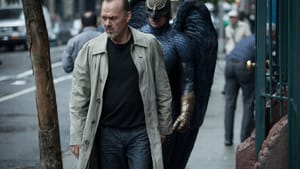Stay in the Loop
BSR publishes on a weekly schedule, with an email newsletter every Wednesday and Thursday morning. There’s no paywall, and subscribing is always free.
A bird’s-eye view
Iñárritu’s ‘Birdman’ (second review)

Everyone seems to walk out of Birdman loving the movie but not being entirely clear what was going on.
The civilians milling around the lobby of the Ritz aren’t the only ones confused: The Hollywood Foreign Press Association decreed it a comedy when they nominated it for best picture (it lost) and Michael Keaton for best actor (he won). A comedy? Really? Maybe in the Shakespearean sense, though I am skeptical that the HFPA was thinking in Shakespearean terms.
Regardless of such larger genre issues, though, the trajectory of the movie itself left all sorts of unanswered questions, “what happened at the end?” being only one of them.
Redemption via Raymond Carver
Keaton plays Riggan Thomson, an actor whose career went in the toilet after he decided to leave the superhero franchise that had made him a star. Twenty years later, he’s trying to redeem himself by directing and starring in a Raymond Carver short story he adapted for Broadway.
After an unsatisfactory actor is conked on the head by a falling spotlight during rehearsal (“I did that,” Riggan confides to his friend and lawyer, Jake [Zach Galifianakis]), hotshot Method actor Mike (Edward Norton) is brought in at the last minute. Mike’s skill and arrogance intimidate Riggan, who’s also unhappy when he sees Mike flirting with Riggan’s fresh-from-rehab daughter, Sam (Emma Stone), whom he’s given a job as his assistant.
Riggan is beset on every side as the clock ticks down to opening night. His girlfriend (and costar) Laura (Andrea Riseborough) thinks she’s pregnant. The fourth member of the cast, Broadway tyro Lesley (Naomi Watts), is Mike’s girlfriend, though the two have a huge fight in the middle of a preview performance. The Times theater reviewer (Lindsay Duncan) flatly tells Riggan that she knows already she’ll give him a bad review because he has no business appearing on Broadway.
Powers and superpowers
Nothing too confusing about any of this, right? Where things get weird is a series of episodes in which Riggan appears to display superpowers. The movie opens with him meditating in his dressing room, cross-legged in his underwear — levitating a couple of feet off the ground. Later, he loses his temper and destroys that dressing room, with objects flying around telekinetically. Then, when Riggan returns from a night spent passed out on a brownstone’s stoop, we watch him swooping over Manhattan’s streets. And of course we hear Birdman scolding and belittling Riggan, and finally see him hovering over Riggan as he walks down the street.
Are these Riggan’s superpowers and/or the manifestation of Birdman’s powers? Is Riggan hallucinating? Or is he, as some have suggested, living in a world of magic realism? Actually, director Alejandro González Iñárritu doesn’t make any particular effort to present the various magical/supernatural events as “really” happening — when Riggan strides into the theater after flying back from his overnight adventure, for instance, he’s chased by the cabbie he just stiffed.
So the flight took place in Riggan’s mind. If the surreal events are just happening in his mind, I wondered, maybe everything that takes place is filtered through his perspective. I had to go back to see the movie again to see if that interpretation holds up throughout — and son of a gun, it does.
Solipsism in action
With that simple judo flip of the viewer’s perspective, the whole movie is transformed, from surrealism to solipsism. The conflicts with Mike? Sure, they butted heads, but Riggan probably didn’t star t wrassling with the semi-naked Mike in the break room. The threats from the Times critic? Again, whether she was in that bar or not, and whether she spoke to Riggan or not, she probably didn’t actually threaten him with a scathing review, because critics don’t do that in the real world. Nor, for that matter, do dozens of clamoring paparazzi gather in the hallway outside the hospital room of a washed-up actor.
t wrassling with the semi-naked Mike in the break room. The threats from the Times critic? Again, whether she was in that bar or not, and whether she spoke to Riggan or not, she probably didn’t actually threaten him with a scathing review, because critics don’t do that in the real world. Nor, for that matter, do dozens of clamoring paparazzi gather in the hallway outside the hospital room of a washed-up actor.
It’s sad and telling to see how Riggan perceives the women in his life, in orbit around his narcissistic gravitational center. His daughter, pressed to explain their estrangement, can only come up with “He was gone a lot, but when he was around he told me I was special”; his ex-wife (Amy Ryan) appears, filled with forgiveness; and, after a preview, his two female costars await his blessing for their performances — for their very beings — before turning to each other and starting to make out. (Hot girl-on-girl action is, I understand, a staple of the American male’s fantasy life.)
The other thing that comes into focus (sic) with this interpretation is the reason for what otherwise seems like a gimmick: Iñárritu and director of photography Emmanuel Lubezki pull out all the stops by shooting the entire two-hour film as though it is a single panning shot.
Hidden in plain sight
There’s one thing that movies just can’t do as well as books: tell a story from the protagonist’s point of view. The camera is, inherently, separate from the action. Because films told from the protagonist’s point of view are so rare — the only other one I can think of offhand is Christopher Nolan’s breakthrough film, Memento — no set of conventions has evolved for them; without conventions, the audience has no guideposts for recognizing that that’s what’s going on.
Thus, few seem to have recognized that there’s a reason for handling Birdman’s entire narrative as a single take. That reason is simple: The filmmakers effectively personalize the camera’s perspective — someone, and not just something, is roaming around backstage at the theater, and that someone is Mr. Alienation himself, Riggan Thomson.
For instance, we catch two glimpses of the drummer providing that phenomenal soundtrack, and both times it’s in a place where a drummer clearly isn’t (on the sidewalk; in the theater’s break room), with Riggan striding by. And the only three scenes in the entire movie that Riggan isn’t in feature daughter Sam and upstart/rival Mike — whose conversational topic is, both implicitly and explicitly, Riggan.
All questions answered?
Note that I’m not arguing that Riggan is psychotic — okay, he probably is, but that question doesn’t interest me particularly. Instead, the strength of the movie is that Mexican-born Iñárritu’s outsider perspective allows him to recognize (and effectively critique) the narcissism of American men of a certain age. He is, however, not without sympathy for it — ultimately, Riggan’s narcissism is so extreme as to be heartbreaking.
The “comedy” the Hollywood Foreign Press Association perceived totally disappeared for me with my second viewing. I laughed more the second time — though not nearly as much as the guy behind us, who was having a fine old time — but my empathy for the character made that laughter rueful.
For Victor L. Schermer’s review of Birdman, click here.
What, When, Where
Birdman, or the Unexpected Virtue of Ignorance. Alejandro González Iñárritu directed; written by Alexander Dinelaris, Nicolás Giacobone, Alejandro González Iñárritu, and Armando Bo; cinematography by Emmanuel Lubezki; music composed by Antonio Sanchez. Philadelphia area showtimes.
Sign up for our newsletter
All of the week's new articles, all in one place. Sign up for the free weekly BSR newsletters, and don't miss a conversation.

 Judy Weightman
Judy Weightman